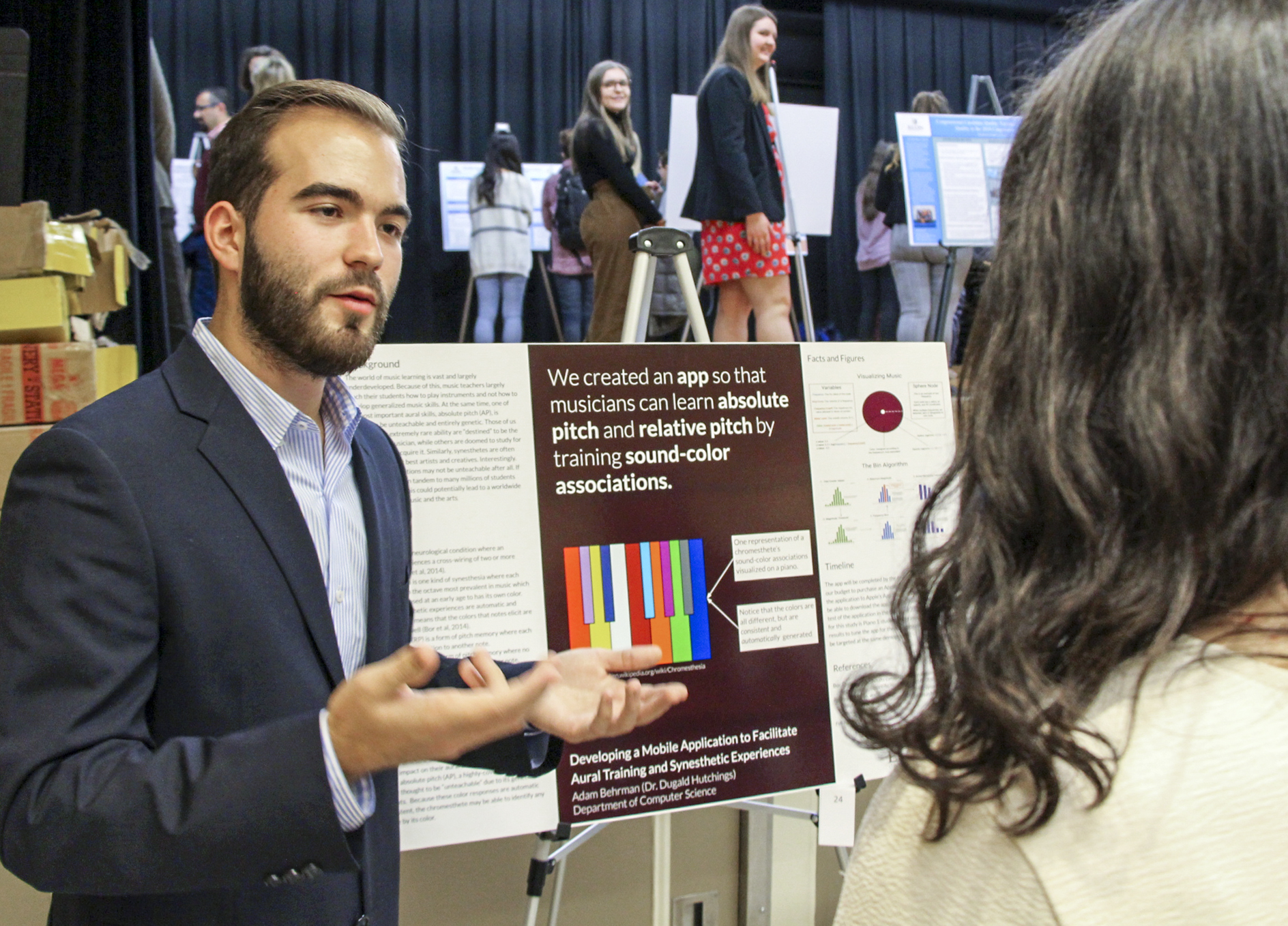Junior Elon College Fellows presented research project proposals at annual event, modeling the process for sophomore Fellows.
How relevant is America’s multitude of local history museums?
Can perfect musical pitch be learned through a color-associative app?
Are in-person interpreters or medical-translation apps most effective for communication between English-speaking doctors and patients of limited fluency?
Those are just three questions behind the undergraduate research projects presented by 40 junior Elon College Fellows on Tuesday night at the Fellows’ annual project proposals poster session. During the hourlong session, they discussed how they selected a topic and their proposed methodology with sophomore Fellows just beginning the process of choosing their mentors and research areas.

Afterward, sophomores and juniors heard from a panel of senior Fellows and an alumnus about the importance of undergraduate research in shaping them as contributing scholars and preparing them for whatever future they plan.
The annual poster session and panel discussion is a longstanding milestone of the Elon College Fellows program, which requires seniors to complete and present high-quality, intellectual research projects. Sophomores get guidance in their research process, and juniors get practice in presenting their ideas publicly.
“For junior Fellows to see their own growth, to see them identify themselves as researchers, is valuable,” said Kim Epting, associate professor of psychology and advisory committee director of Elon College Fellows. “It allows them to present in a safe, friendly, professional environment. Sophomores also see that people are in different stages of research, which is natural.”
During the next 16 months, junior Fellows will delve into their chosen topics seeking answers and advancing research in the three branches of art and science disciplines: social sciences, mathematics and natural sciences, and arts and humanities.
Elon College Fellows is a four-year scholarship program that fosters deep exploration of the breadth, connections and relevance of the arts and sciences. Housed within Elon College, the College of Arts and Sciences, each of the program’s four years is marked by academic rigor and achievement. First-year Fellows explore the three branches. Sophomores declare majors, choose mentors and an area of research. Juniors hone their research topic and methodology, publicly presenting results during their senior year.

Kamaria Majors ’21 had no idea what she wanted to research when she attended the session as a sophomore last year. On Tuesday, she stood proudly before her poster, articulating the goals of her research and the method she would use with 24 pairings of doctors and patients at the Open Door Clinic of Alamance County next fall. The topic came to her while volunteering at the clinic last summer, when she realized little research had been done on how patients with limited English proficiency prefer to communicate with medical providers.
“I saw the usefulness of those interpretation methods, but also their shortcomings,” Majors said. “Last year, seeing what others had done helped me to know what I needed to do. Now I feel accomplished. I feel confident going forward.”
Sophomore English major Emily Sledge is in the thick of choosing a research subject and mentor this semester. Tuesday’s session put her somewhat at ease.
“What I’ve found out is that a research topic can find itself in the process of working with a mentor,” Sledge said. “Everyone has something unique to bring to the process.”

At the panel discussion, seniors Jacob Hayward, Joey Paturzo and Laura Braley spoke about finding confidence in themselves as scholars making contributions to their fields. Ginny Oberle ’14, a Fellows alumnus, moderated the discussion. From Hayward’s study of healthcare in prisons, to Paturzo’s cutting-edge scientific research, to Braley’s examination of the literature of young-adult grief, each of them said they were conducting research to advance their fields or fill a gap of existing knowledge.
“My research is a preliminary step in a preliminary field that has the possibility to impact technology long after I’m gone,” Paturzo said.
“I’m motivated in prison reform,” Hayward said. “Someday, maybe someone will see my research and say: This is it.”
Nancy Harris, associate dean of Elon College, the College of Arts and Sciences, closed the evening by reflecting on the meaning of the Fellows program and the critical study of arts and sciences.
“This event tells the story of Elon, that’s told by admissions and that’s told by the College of Arts and Sciences, of what can happen to you when you come to a place like Elon University,” Harris said. “Because you have practiced all these wonderful skills that will help you do a myriad of things, you can say: Yes, I may be a sociology major; yes, I may be a creative writing major, but I may be anything.
“You have reenacted tonight what it means to be an Elon College Fellow at Elon,” she said.




